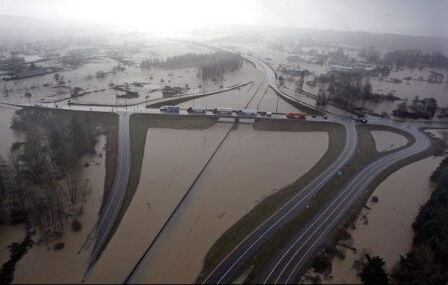Will Climate Change Destroy Our Roads?
It seems the National Research Council is trying to recruit pistonheads to the global warming cause. What's the pitch? Climate change could be catastrophic to America's roads and highways. NPR reports that the NRC has identified 60,000 miles of highways, major airports, railroads, low-lying tunnels and ports which could be increasingly vulnerable to flooding and sea-level rise. Hotter summers could also buckle asphalt, stress bridge joints and deform railroad tracks. The NRC's warning comes on the heels of a federal study of 48 Gulf Coast counties, which are expected to experience sea level rise sooner than most of America. That study found that a four-foot rise in sea level would inundate 24 percent of interstates in the area and 28 percent of arterial roads. Oh well… by the time oceans rise four feet, "enthusiast cars" will likely be banned. And the best driving roads are in the mountains anyway.
More by Edward Niedermeyer


































Comments
Join the conversation
They really are grasping at straws. There may be hope for civilization yet! I would think the bureauweenies would be thrilled that some roads, airports, etc are about to take an unexpected bath. This means we need new roads, airports, etc. This means we need to raise taxes for said things. This means we can restrict how people use these new things. This means more money to hand out as political favors to our connected friends and "associates". Bah. I'd take a stab at debunking this rot, but it's Friday, and I'm under the weather and not in the mood. I get tired of repeating myself anyway. Oh all right, one point: After all this time telling pistonheads that we are responsible for a litany of evils, ranging from environmental damage (not all of which are complete hooey) to dependence on foreign oil (also not complete hooey), they now have the unmitigated gall to try and court our favor by telling us that if we don;t help them our roads will disappear? They don't want us to drive as it is! Public transportation (especially expensive and ineffective light rail) is what they want us to use, and failing that only cars and trucks they "approve" of. Actually, only cars, since they don't approve of trucks at all, even for people that legitimately need them. Too little, too late, chaps.
Seeing as the Gulf Coast counties are at at or below sea level, who do we blame? The Canadians and Americans for driving around in reasonably clean cars, or the idiots who build cities below sea level and then wonder why they flood? By the way, sea levels haven't really risen over the past few decades, despite what the tree hugging hippies want us to think. I don't have my sources at hand, but recent measurements have shown the sea level is staying the same, or even dropping slightly, on average. Sure, there's limited rises restricted to certain areas at certain times, but overall, sea levels don't seem to show a rising trend, so I think we'll be safe from a four foot rise that won't arrive.
Has anybody ever questioned how much ice mass is located on land (melting floating ice has no effect on the water level)? Is their really that much ice that if all of it melted, the oceans-which look pretty big on the globe sitting behind me-would actually rise 4 feet? It seems to me that all of the land mass would have to be covered in ice at an average thickness of over 12 feet for the oceans to rise four feet if all of that ice were to melt. Now, I know that there are many places where there is over 12 feet of ice year round; however, I also know that ther are many many times as much land that never has any ice or snow on it (unless you drop your blended margarita).
I suppose that moving to higher ground is not in the cards?